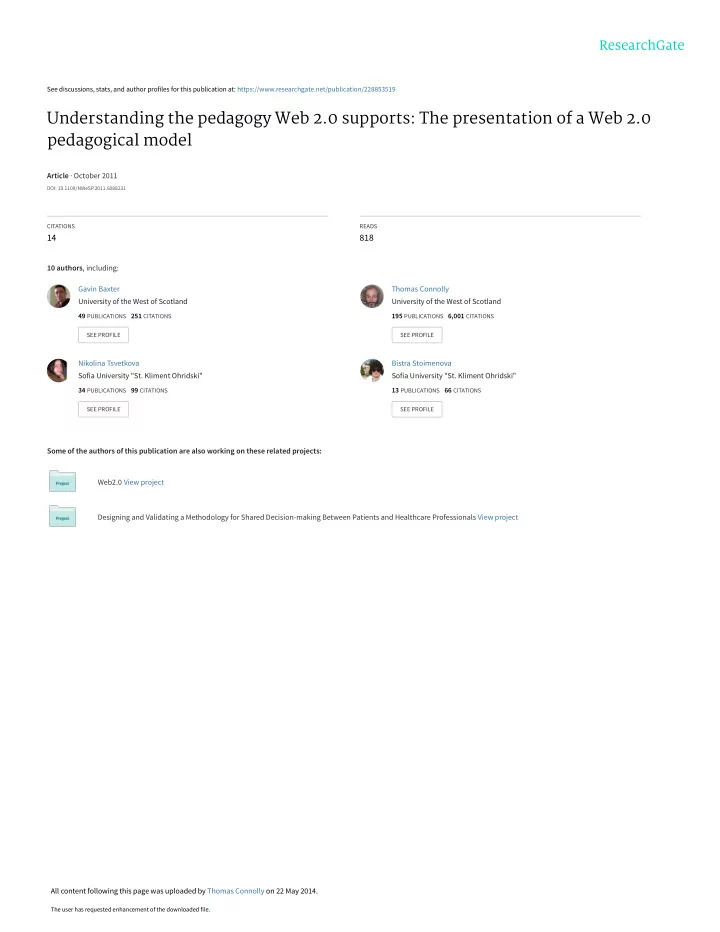

See discussions, stats, and author profiles for this publication at: https://www.researchgate.net/publication/228853519 Understanding the pedagogy Web 2.0 supports: The presentation of a Web 2.0 pedagogical model Article · October 2011 DOI: 10.1109/NWeSP.2011.6088231 CITATIONS READS 14 818 10 authors , including: Gavin Baxter Thomas Connolly University of the West of Scotland University of the West of Scotland 49 PUBLICATIONS 251 CITATIONS 195 PUBLICATIONS 6,001 CITATIONS SEE PROFILE SEE PROFILE Nikolina Tsvetkova Bistra Stoimenova Sofia University "St. Kliment Ohridski" Sofia University "St. Kliment Ohridski" 34 PUBLICATIONS 99 CITATIONS 13 PUBLICATIONS 66 CITATIONS SEE PROFILE SEE PROFILE Some of the authors of this publication are also working on these related projects: Web2.0 View project Designing and Validating a Methodology for Shared Decision-making Between Patients and Healthcare Professionals View project All content following this page was uploaded by Thomas Connolly on 22 May 2014. The user has requested enhancement of the downloaded file.
Understanding the Pedagogy Web 2.0 Supports: The Presentation of a Web 2.0 Pedagogical Model Gavin J Baxter, Thomas M Connolly, Mark H Nikolina Tsvetkova Stansfield, Carole Gould Faculty of Philosophy, School of Computing Rumyana Kusheva, Bistra Stoimenova, Rositsa University of the West of Scotland Penkova, Mirena Legurska, Neli Dimitrova Paisley, Scotland Department of Information and In-service Training of {thomas.connolly, gavin.baxter, mark.stansfield, Teachers carole.gould}@uws.ac.uk Sofia University “St Kliment Ohridski” Sofia, Bulgaria nina.tsvetkova@gmail.com, {kushevi_r, bstoimenova, r.penkova, legurska_mirena}@abv.bg, neli_di@gbg.bg Abstract —This paper explores the concept of Web 2.0 and means in an educational context. The changing role of the provides an overview of three types of Web 2.0 tools currently teacher is briefly discussed to demonstrate how Web 2.0 use used in education today, namely, wikis, blogs and online is transforming how learning occurs in the classroom. Three forums. The paper also presents the results of a systematic examples of Web 2.0 tools, namely, wikis, blogs and online literature review on Web 2.0 in education, the findings of forums are also reviewed to indicate what their pedagogical which revealed a lack of Web 2.0 pedagogical models in the benefits are for both educators and students. The results of a literature. This paper makes a contribution to knowledge in systematic literature review on Web 2.0 in education are also the area of Web 2.0 use in education by presenting a Web 2.0 discussed, the findings of which revealed a lack of Web 2.0 pedagogical model to inform educators of how to apply the pedagogical models in the literature. A Web 2.0 pedagogical learning theories associated with Web 2.0 in the classroom. In model is presented to assist educators in gaining a greater addition, the paper presents the findings of a teacher training understanding on how to apply the learning theories course based on the Web 2.0 pedagogical model taught associated with Web 2.0 in the classroom. The findings from through the use of an integrated Web 2.0 platform that was use of the model in a teacher training course are then carried out as part of a large-scale evaluation of Web2.0 across presented. A supporting framework is discussed in Baxter, Europe. Connolly, Stansfield, Tsvetkova and Stoimenova [1] and an evaluation of a large-scale pilot of the use of Web2.0 in Keywords: Web 2.0; Wikis; Blogs; Online Forums; Teacher education that uses this pedagogy in Connolly et al. [2]. Training; Web 2.0 Pedagogical Model. I. I NTRODUCTION II. T HE CONCEPT OF WEB 2.0 Web 2.0 is a term that appears to have strong associations Web 2.0 is an expression that has different meanings to within the educational sector. The phrase Web 2.0 often different individuals. One possible reason for this is that relates to how the application of certain Web 2.0 tools such people’s perceptions of Web 2.0 are based on how they use it as wikis, blogs and online forums can enhance the learning or their opinions of the concept are formed from how it has experience of students in the classroom. However, the use of been applied throughout their daily lives. For example, Web 2.0 in the classroom is also changing the way in which individuals could have different experiences of having used Web 2.0 in the classroom, or as part of an online community teachers deliver their lessons and how they fulfill the or in the context of organizational learning when engaged in learning expectations of students. It is important that educators adopting the use of Web 2.0 understand the training and personal development courses at work. pedagogy of Web 2.0 prior to introducing a Web 2.0 tool However, several definitions of Web 2.0 have been into the classroom. In doing so, educators can ensure that the proposed in the literature. For example, according to Web 2.0 application they are using will help them achieve Aharony [3: 227] the concept of Web 2.0 “…emphasizes the the desired learning outcomes of their courses. However, the value of user-generated content. It is about sharing and literature surrounding Web 2.0 in the classroom seems to be about communication and it opens the long tail which allows lacking evidence of the success or otherwise of different small groups of individuals to benefit from key pieces of the underlying pedagogical models and how these pedagogies platform while fulfilling their own needs”. This definition can be applied to facilitate the intended learning outcomes of suggests that Web 2.0 is associated with notion of openness a course. and transparency in terms of how individuals share The outline of this paper is as follows. The concept of information among one another when engaged in using a platform that supports the use of Web 2.0 tools. In contrast, Web 2.0 is examined to provide clarity about what the term
Recommend
More recommend